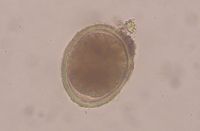Difference between revisions of "Toxocara cati"
| Line 1: | Line 1: | ||
| − | {{ | + | {{review}} |
{{Taxobox | {{Taxobox | ||
| Line 17: | Line 17: | ||
{| cellpadding="10" cellspacing="0" border="1" | {| cellpadding="10" cellspacing="0" border="1" | ||
| Also known as: | | Also known as: | ||
| − | | '''Toxocara mystax | + | | '''''Toxocara mystax |
|- | |- | ||
|} | |} | ||
| Line 26: | Line 26: | ||
==Hosts== | ==Hosts== | ||
| − | Cat | + | Cat |
==Identification== | ==Identification== | ||
| − | ''T. catis'' is a large white worm. | + | ''T. catis'' is a large white worm. The female is capable of growing up to 10cm in length. The male, similar to ''[[Toxocara canis]]'', has a finger-like process on the tip of the tail. |
The eggs have no distinct colour, but have a thick outer shell. | The eggs have no distinct colour, but have a thick outer shell. | ||
| Line 36: | Line 36: | ||
Infection occurs by ingestion of the L2 in the egg, or after ingestion of a paratenic host, or via transmammary infection. | Infection occurs by ingestion of the L2 in the egg, or after ingestion of a paratenic host, or via transmammary infection. | ||
| − | After direct ingestion of the larvae, they migrate through the liver, lungs and trachea, and then go back into the stomach, where they transform into L3. | + | After direct ingestion of the larvae, they migrate through the liver, lungs and trachea, and then go back into the stomach, where they transform into L3. Ingestion of a paratenic host e.g. a mouse causes the larvae to be released by digestion, and they then enter the stomach of the cat, and will moult into L3. |
Transmammary infection is also very important, and commonly seen throughout lactation. However, unlike ''T. canis'', prenatal infection does not occur. | Transmammary infection is also very important, and commonly seen throughout lactation. However, unlike ''T. canis'', prenatal infection does not occur. | ||
| Line 44: | Line 44: | ||
[[Category:Ascaridoidea]][[Category:Cat Nematodes]] | [[Category:Ascaridoidea]][[Category:Cat Nematodes]] | ||
[[Category:To_Do_-_Max]] | [[Category:To_Do_-_Max]] | ||
| − | [[Category: | + | [[Category:Expert_Review]] |
Revision as of 10:24, 4 August 2010
| This article has been peer reviewed but is awaiting expert review. If you would like to help with this, please see more information about expert reviewing. |
| Toxocara cati | |
|---|---|
| Class | Nematoda |
| Super-family | Ascaridoidea |
| Also known as: | Toxocara mystax |
Toxocara cati is a nematode of the superfamily Ascaridoidea. T. cati is found worldwide, and can cause a wide range of gastrointestinal problems in infected hosts.
Hosts
Cat
Identification
T. catis is a large white worm. The female is capable of growing up to 10cm in length. The male, similar to Toxocara canis, has a finger-like process on the tip of the tail.
The eggs have no distinct colour, but have a thick outer shell.
Life Cycle
Infection occurs by ingestion of the L2 in the egg, or after ingestion of a paratenic host, or via transmammary infection.
After direct ingestion of the larvae, they migrate through the liver, lungs and trachea, and then go back into the stomach, where they transform into L3. Ingestion of a paratenic host e.g. a mouse causes the larvae to be released by digestion, and they then enter the stomach of the cat, and will moult into L3.
Transmammary infection is also very important, and commonly seen throughout lactation. However, unlike T. canis, prenatal infection does not occur.
The prepatent period of T. catis is 8 weeks.
